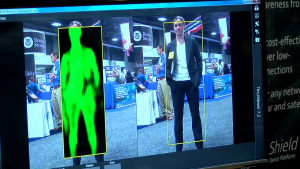by Brianna Crandall — December 30, 2016 — Digital Barriers, a specialist provider of visually intelligent solutions to the global surveillance, security and safety markets, recently announced that it has secured a contract with the U.S. Transportation Security Administration (TSA) to enhance the capability of the group’s ThruVis solution for the detection of objects such as weapons and explosives concealed under clothing.

ThruVis technology is being enhanced for operators of airports, mass transit systems and other public spaces across the USA to protect against terrorist attacks.
ThruVis is a highly sensitive camera designed to deliver a unique level of performance and real world usability. It can be deployed in various settings, including transport terminals, stadia and event venues, to identify potential threats in real time without disrupting crowd throughput. In recent independent government testing, it proved 100 percent successful in identifying suicide vests and weapons concealed under clothing, says the company.
In multiple trials and real-world deployments, ThruVis has been proven to be materially effective, says Digital Barriers, with the highest detection rates and throughput. The solution also includes automatic threat detection to remove the need for manual camera operation. ThruVis can reportedly detect metal or plastic weapons, explosives, liquids, drugs and currency. ThruVis is portable, requires no infrastructure, and can be set up in minutes; unlike other technologies it is also completely passive, and is entirely safe to use, as well as being non-invasive, revealing no sensitive anatomical details, notes the company.
Zak Doffman, CEO of Digital Barriers, commented:
ThruVis completely changes our ability to protect so-called soft targets from terrorist attack. Now for the first time, after ten years and tens of millions of dollars in public and private investment, we can genuinely detect concealed weapons and explosives being carried into crowded public spaces, onto transport networks, or into airports. No other technology anywhere in the world can match ThruVis for performance and usability, as has been categorically proven in recent independent testing.
For further information, see the ThruVis product page on the Digital Barriers Web site.




